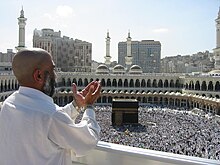Islam/Introduction



Islam is one of the major monotheistic religions of the world. More than 1 billion people practice the religion all over the world making it the second-largest religion in the world. The followers of Islam are called Muslims.
Muslims believe in one God, commonly referred to as Allah (Literally, "The God" in Arabic; the word is pronounced Aal-lah).
Basics[edit | edit source]
The main points of the Islamic creed comprise: belief in God, his Messengers, his Angels, his Revelation, Day of Judgement, Fate and Eternal life after death.
Although all of a believer's life comprises worship, this is achieved in a believer's life in practice through pure worships and following a moral code in all transactions, whether they be trade, work, politics and social relations.
The worships comprise of mandatory and recommended worships. The well known mandatory worships comprise:
Muslims are required to adhere to the 5 basic Pillars of Islam which are obligatory for them. These are Shahadah (belief in Allah and His Prophet), Salat (prayer), Zakat (alms-giving), Sawm (fasting), and Hajj (Pilgrimage to Makkah).
Pillars of Islam[edit | edit source]
Shahadah[edit | edit source]
see Wikipedia article Shahadah
Prayer[edit | edit source]
These prayers are called 'Salat' in Arabic. Five times a Day.
- Fajr: Performed at dawn, before sunrise
- Zuhr: Performed at midday
- Asar: Performed at the late part of the afternoon
- Maghrib: Performed after sunset
- Ishaa: Performed between sunset and midnight
Payment of a Tax[edit | edit source]
All Muslims that have "nisab" (minimum amount of wealth that makes Zakat payable), they must calculate and pay their Zakat exactly one lunar year from this day. A person has to pay 2.5% of their wealth as Tax.
Fasting the month of Ramadan[edit | edit source]
There are about 30 Fasting in the Month of Ramadhan (A lunar month of Arabic Calender) in which a person can't eat and drink from just before sunrise to sunset.
Performing Pilgrimage to Makkah[edit | edit source]
A Muslim will visit Makkah in the Month of thul Hijja (A lunar month of Arabic Calender).
Recommended worships include superogratory prayers, invocations, recitation of the Quran, superogratory fasts to mention but a few.